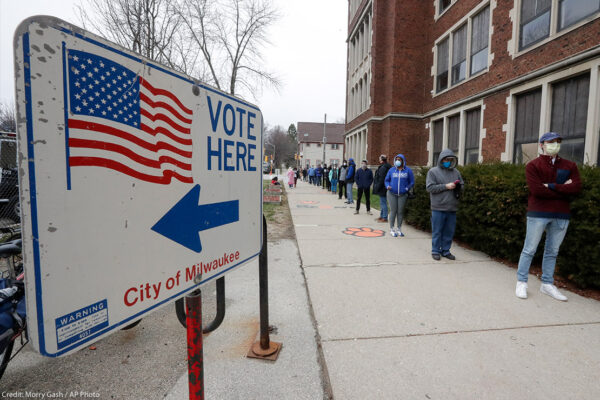No one should have to choose between their health and their vote, but during the Wisconsin primary, an estimated 19,000 Milwaukeeans were forced to risk their health to cast their primary ballots. Already, at least seven positive COVID-19 cases have been linked to in-person voting in Milwaukee, including one poll worker who may have interacted with hundreds of other voters, and 19 cases have been linked to the primary statewide. Wisconsin is a preview of what could happen in November if we don’t act. That’s why we’re fighting in the halls of Congress and in courts across the country to adopt common sense solutions to protect every voter’s right to safely cast a ballot during the COVID-19 pandemic and to protect their rights while doing so.
To protect our democracy, it’s imperative that we expand early voting, allow every eligible voter to vote by mail, and reduce the logistical, financial, and health barriers that inhibit voting by mail. Currently, there are approximately 16 states that do not allow no-excuse absentee voting by mail. In a number of these states, the limitations are codified in state law or within the states’ constitution, making litigation and congressional action necessary to allow people to safely vote this election cycle.
Advocacy
At the national level, we’re calling on Congress to increase federal funding for elections administration, and to mandate national standards for no-excuse absentee voting and a minimum 14-day early vote period, to ensure that every eligible American can vote safely in November. An increase in federal resources is necessary to help states safely administer elections and process a surge of mail-in ballots in a timely and secure manner.
We are also urging municipal, local, and state-level policymakers to expand access to absentee ballots and extend early voting periods so that their constituents can avoid physical polling locations or minimize their interactions with other voters if they choose to vote in person. Officials from across party lines have already expanded eligibility to vote by mail to all voters in a wide range of states, including Alabama, Indiana, New Hampshire, New York, and West Virginia. We’re bolstering these bipartisan efforts to expand access to vote by mail through litigation in a series of states.
Litigation
In Texas, we filed a lawsuit with coalition partners, seeking to expand Texans’ access vote by mail.
In Missouri and South Carolina, we are similarly suing to make absentee mail-in balloting available to all eligible voters. Vote by mail will be the safest option for many during this pandemic.
We are also challenging states that have burdensome, unsafe, or financially prohibitive restrictions to voting by mail. We are suing in Virginia, Missouri, and South Carolina so that voters can vote by mail without having to get a witness signature on their ballots — an unnecessary requirement and a clear violation of public health experts’ social distancing recommendations. Beyond challenging witness signature requirements, we are in court over Georgia’s failure to provide prepaid postage on mail-in absentee ballot envelopes, and in Montana, we’re suing to ensure that all voters can get assistance when sending their ballots to election officials. Voters shouldn’t have to go to extraordinary lengths, withstand financial pressure, or put themselves in danger to cast their ballots.
In this tumultuous and uncertain time, one thing we know is that we must prepare for the general election in November.
We’ll keep fighting to safeguard both the nation’s health, and our democracy.
Dale Ho, Director, Voting Rights Project, ACLU
Sonia Gill, Senior Legislative Counsel, ACLU

